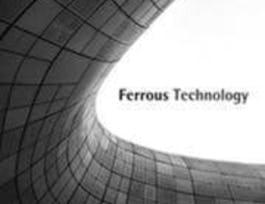If you have ever encountered rusty car bodies, leaking pipes, tarnished silverware or the green patina of a copper roof then you have experienced corrosion in action. This course, from the Corrosion@Manchester team in collaboration with AkzoNobel, will teach you why metals corrode, what the environmental consequences are, how much corrosion costs and how corrosion can be controlled. It is designed for students, householders, teachers, professionals and anyone in-between.


Protecting the World: Introducing Corrosion Science and Engineering
Taught in English
Some content may not be translated
20,485 already enrolled
(862 reviews)
Details to know

Add to your LinkedIn profile
22 quizzes
See how employees at top companies are mastering in-demand skills


Earn a career certificate
Add this credential to your LinkedIn profile, resume, or CV
Share it on social media and in your performance review

There are 4 modules in this course
In Week 1 we show you the scientific and engineering concepts that are important to an understanding of corrosion in practise. Section 1 provides a brief outline of what corrosion is, how much it costs and how corrosion engineers can help. Section 2 lists, with examples, the eight types of corrosion and shows the important of good engineering design on corrosion control. Section 3 focuses on materials properties and introduces how the corrosion of metals (zinc) may be understood. Section 4 looks directly at the economic and social consequences of corrosion. In section 5 we pick up the pace to focus on the science of electrochemical corrosion. Finally, in section 6, we wind up with a selection of corrosion failures chosen from the Corrosion@Manchester museum.
What's included
44 videos5 quizzes
This week, will discuss how cathodic protection works and how it can be applied in practice to protect metallic structures.Firstly, we’ll discuss some of the basic principles behind cathodic protection, and we will see how some of the concepts you have learned in the other units are applied in a cathodic protection scenario.Subsequently, we’ll discuss some aspects related to the design of cathodic protection systems, such as for example the criteria that have to be satisfied to achieve a good level of corrosion protection, or the method used to assess the requirements for an existing structure in terms of cathodic protection current.Finally, we’ll touch on cathodic protection of reinforced concrete structures, discussing the factors that contribute to good concrete quality and discussing how we can protect the reinforcement steel bars by using cathodic protection.This week’s material is split into 6 sessions. Each session lasts approximately 20 minutes; at the end of each session, there will be a quiz to test your knowledge.
What's included
7 videos6 quizzes
In Week 3, we will introduce Surface Engineering. The learning materials for this week are organised into five sections. Throughout the week, we will clarify what surface engineering is and why surfaces are important. We will look into how coatings protect surfaces from corrosion and will discuss coating design criteria. We will also consider various Surface Engineering techniques. Finally, we will turn our attention to industrial applications of coatings for corrosion protection, coating performance and failure mechanisms.
What's included
6 videos5 quizzes
Week 4 provides an introduction to oilfield corrosion science and engineering. You will learn about pertinent corrosion phenomena, as well as other degradation processes, along with approaches to minimise facility degradation. Specific topics include: types of oilfield equipment; sweet/sour corrosion; seawater corrosion; scaling; erosion; corrosion prediction; corrosion inhibition; corrosion management. All content in this section is section is licensed under Creative Commons Atrribution-NonCommercial-NoDerivs 3.0 Unported License
What's included
19 videos6 quizzes
Instructors

Offered by
Recommended if you're interested in Mechanical Engineering

L&T EduTech

University of Rochester

University of Rochester

Pohang University of Science and Technology(POSTECH)
Why people choose Coursera for their career




Learner reviews
Showing 3 of 862
862 reviews
- 5 stars
75.34%
- 4 stars
18.05%
- 3 stars
3.47%
- 2 stars
1.04%
- 1 star
2.08%

Open new doors with Coursera Plus
Unlimited access to 7,000+ world-class courses, hands-on projects, and job-ready certificate programs - all included in your subscription
Advance your career with an online degree
Earn a degree from world-class universities - 100% online
Join over 3,400 global companies that choose Coursera for Business
Upskill your employees to excel in the digital economy
Frequently asked questions
Access to lectures and assignments depends on your type of enrollment. If you take a course in audit mode, you will be able to see most course materials for free. To access graded assignments and to earn a Certificate, you will need to purchase the Certificate experience, during or after your audit. If you don't see the audit option:
The course may not offer an audit option. You can try a Free Trial instead, or apply for Financial Aid.
The course may offer 'Full Course, No Certificate' instead. This option lets you see all course materials, submit required assessments, and get a final grade. This also means that you will not be able to purchase a Certificate experience.
When you purchase a Certificate you get access to all course materials, including graded assignments. Upon completing the course, your electronic Certificate will be added to your Accomplishments page - from there, you can print your Certificate or add it to your LinkedIn profile. If you only want to read and view the course content, you can audit the course for free.
You will be eligible for a full refund until two weeks after your payment date, or (for courses that have just launched) until two weeks after the first session of the course begins, whichever is later. You cannot receive a refund once you’ve earned a Course Certificate, even if you complete the course within the two-week refund period. See our full refund policy.








